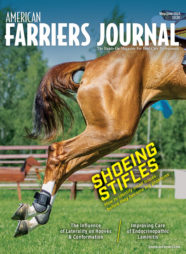In our December 2012 issue, we'll feature a story of farrier health and how the long-term effects of farriery contribute to gradual body wear and tear. In it, neurosurgeon and horseman James Warson reasoned that those able to make it a long-term career were strong to begin with, and get stronger through their work. Warson has had experience performing surgery on farriers and is familiar with their line of work.
“I think the weak simply fade away,” he says in regard to why he doesn't see more farriers in need of operations.
Yes, farriery is tough, demanding work that takes a toll on the body. However, Warson's statement goes beyond the farrier's body. Doesn't it hold true concerning everything about a footcare practice?
Here's a few things that make up a farrier: knowledge of anatomy, skills in the forge, horsemanship, customer service and business savvy. There are many more, but being critically weak in any of these areas can spell doom for a farrier, even if strong in the other areas.
I think to translate Warson's statement to all of the facets of being a farrier, the weakness isn't necessarily the insufficiency of those facets that comprise a farrier. Instead the weakness is that the farrier is unwilling to embrace self-improvement. Maybe it is just plain laziness. Maybe the farrier believes that he or she already knows enough and has nothing left to learn. Whatever the case, there is a weakness that jeopardizes a career.
And if the farrier fails to address and correct that mindset, he or she will, as Warson puts it, "simply fade away."








Post a comment
Report Abusive Comment